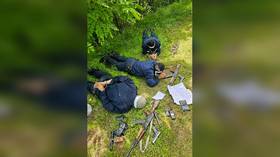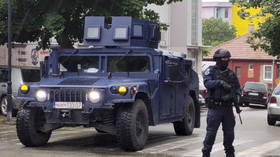Kosovo has ‘crossed the Rubicon’ – Serbia

Serbian President Aleksandar Vucic accused the ethnic Albanian government in Pristina of trying to provoke a war on Wednesday, after the breakaway province closed the border to all Serbian vehicles and arrested several prominent Serbs.
Kosovo Prime Minister Albin Kurti ordered the closure of the border after three Kosovo police officers were detained by Serbian security forces on Tuesday morning. He has said that the blockade will remain in effect until the three men are released.
Kurti claimed the trio was “abducted” inside Kosovo in “open acts of international aggression” by Serbia. Vucic has said they were on the other side of the line of control and that he had proof.
“They were arrested 1.8km from the administrative line,” Vucic told the state broadcaster RTS on Wednesday evening. “That’s pretty far from the place where they left their car. Kurti says they were 300 meters from the line. What were they doing 300 meters from the line, without telling KFOR?” he added, referring to the NATO peacekeeping mission.
The blockade is an attempt to starve the Serbs in the north of Kosovo and force them out of their homes, Vucic argued.
Kurti “wants to start a war at all costs,” the Serbian president added. “The Rubicon has been crossed and it will be hard to get back to normal.”
Vucic also objected to Tuesday’s arrests of two prominent Serbs, whom the ethnic Albanian government accused of organizing an “attack” on NATO peacekeepers last month. He claimed that the EU and NATO had given him guarantees there would be no arrests but had done nothing to stop Kurti.
EU foreign policy commissioner Josep Borrell also sent a letter to Kurti on Wednesday urging him to “de-escalate” the situation. In what amounted to unusually strong language from Brussels, Borrell wrote that Pristina needs to “take the opinions of EULEX and KFOR fully into account and treat them as partners, which also means coordinating with them in advance,” which was not the case on Tuesday. EULEX is the European bloc’s civilian mission tasked with monitoring Kosovo.
“As 27 EU Member States have made it very clear, failure to de-escalate will result in negative consequences,” Borrell warned.
Albanian Prime Minister Edi Rama has already canceled a meeting with Kurti scheduled for Wednesday, saying it could not be held due to the “hourly worsening of Kosovo’s relations with the entire Euro-Atlantic community.”
Kurti’s crackdown has gone beyond just the Serbs, however. His government has also revoked the license of the privately owned TV outlet ‘Klan Kosova’, which the head of the Association of Journalists of Kosovo described as “an unprecedented act aimed against media freedoms.”
Ramush Haradinaj, a former commander of the Kosovo Liberation Army (KLA) and leader of the AAK opposition party, was quoted by local media on Wednesday as saying that Kurti was “threatening Kosovo’s alliance with the US and NATO” and called for a no-confidence vote against the prime minister.
NATO deployed troops in Kosovo in 1999, after a 78-day bombing campaign against Serbia. Belgrade has refused to recognize Pristina’s 2008 declaration of independence.













